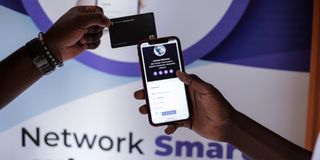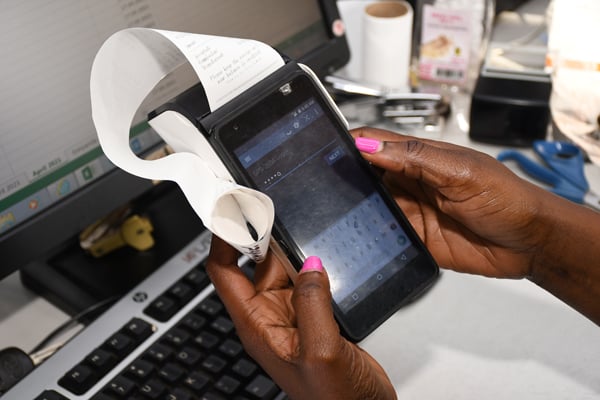Prime
Mulwana: Technology visionary innovates digital business card

The Malticard business card needs a single tap on another person’s phone to obtain their contact details. PHOTOS/Paul Murungi
What you need to know:
In October 2021, a brilliant idea crossed Joshua Mulwana’s mind as he scanned through his Twitter account. The idea he saw was some bit of novelty to his eyes; a digital business card. But what he saw was actually millions of miles away in the United States of America.
“The human mind is naturally creative,” famous author Robert Greene writes in his book, Mastery.
In the author’s view, the mind wants to explore, to discover new aspects of the world, and to invent. To express this creative force is man’s greatest desire.
In October 2021, a brilliant idea crossed Joshua Mulwana’s mind as he scanned through his Twitter account. The idea he saw was some bit of novelty to his eyes; a digital business card.
But what he saw was actually millions of miles away in the United States of America.
Think of a lifetime digital business card that needs a single tap on your phone to exchange contact details. Back home in Uganda, Mulwana knew it was a ‘hot’ idea to execute and it made sense for possible investment.
“The technology was originating from the US, and I didn’t see anything of a kind in Uganda,” he recalls with a radiating face for the light bulb moment.
“So I decided since I have been in the marketing field for three years, and I thought, if this was put into the direction of marketing, it would be a big deal,” he notes.
Early this year, angel investors armed Mulwana with a capital injection of Shs 13 million. After making thorough research about the technology, he set out to turn his idea into a bankable project.
First, he built a reliable Information Technology team, and then made contacts with a supplier of some of the raw materials from China.
In the last six months, Mulwana’s idea has moved from a simple tweet into the Malticard, a digital business card that has earned him a clientele base of 700 people in his database.
“I researched and got a supplier for the cards from China. They make the cards and, I do all the programming from here,” he says.

Joshua Mulwana displays the Malticard business card.
More than just a digital business card
The idea of using an electronic business card doesn’t require direct physical contact.
One needs a single tap using the digital card on another person’s phone to obtain their contact details.
The card is built with activated Near Field Communication (NFC) technology or one can use a Scan Quick Response (QR) code for a mobile phone.
According to Mulwana, Near- field communication is a set of communication protocols that enables communication between two electronic devices over a distance of four centimeters or fewer.
Most modern smartphones have an inbuilt near field technology to communicate effectively.
The technology offers a high- speed wireless connection through a simple setup of two phones tagged closer to each other.
It can also be used to bootstrap more capable wireless connections for other devices such as tablets and computers.
The digital business card is interactive in such a way that there’s instant share of your professional contact details, social media profiles, or websites to another person with a single tap on their phone.
“It’s a physical contact-free while making real connections especially during this Covid- 19 era. You safely share your information while leaving a lasting impression with people you meet,” he says.
The digital card operates on internet for quick logins, and Mulwana explains that this is partly because all user profiles are uploaded on a central platform protected by a server in the USA.
“If someone has not internet, I will still tap your phone, and the details will go into your notifications, and once you get access to internet, you log on and tap the notifications for the contact information to load,” he says.
The tech savvy mechanical engineer says, he wanted to help organisations network better and smarter with less expenditure on physical business cards, and possibly owning a lifetime digital business card.
“With Malticard, we are building real time statistics; if a boss gives a card to an employee, they will be able to actually see how many times that employee has networked,” he says.
Mulwana observes that a digital business card can be used by both individuals and businesses to quickly and sustainably exchange contact information since it is more engaging, cost-effective, and eco-friendly than traditional physical business cards.
Mulwana believes a digital card is more of a networking tool that can drive traffic to a website, social media platforms as one turns meetings and interactions into key business leads and evolving the business and client base.
Beyond the simple exchange of contact information, the card can be altered to serve other purposes such as a clock in clock out company identity card.
“It can also be used as a company ID, or clock in or clock out. Depending on what the organisation wants to use it for, we can always program it for a client in that direction,” he says.
The card details can also be edited and updated in real time, in an instance where a person has assumed a new role.
Cost
Mulwana’s digital business card costs Shs 45000 for a one off purchase, and Shs 1000 per month for subscription as a maintenance fee to protect a client’s private data on the company’s system.
For bulk purchases, Mulwana says, his team first does an electric survey to find out how much equipment the company needs especially if the card Is to double as a clock in clock out card.
“We are working on other plans such as customizing it to on board features such as uploading a presentation or a Curriculum Vitae,” Mulwana shares his vision for the future of the digital card.




